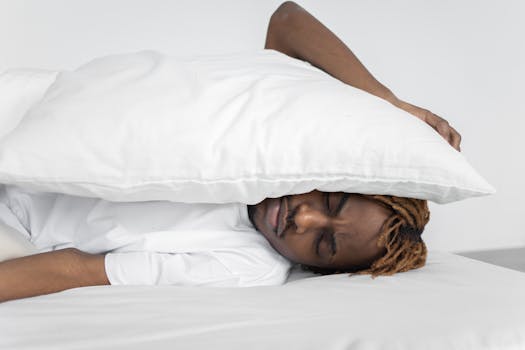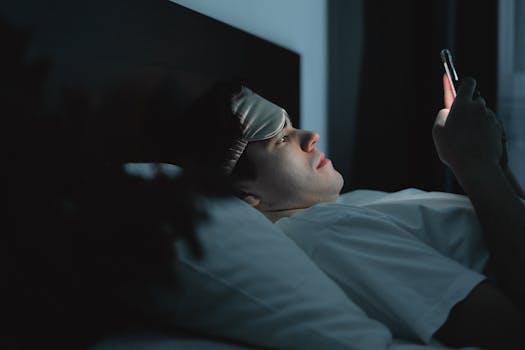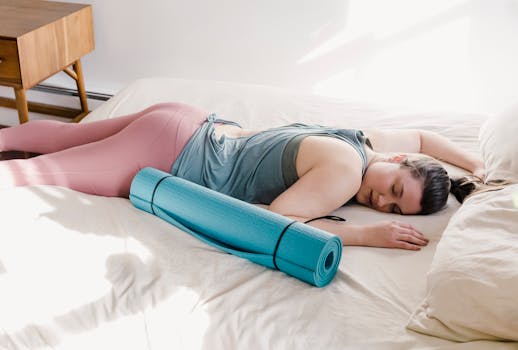
“
Creating a Balanced Sleep Routine for Better Rest
Focus Keyword: Creating a Balanced Sleep Routine

Creating a balanced sleep routine is essential for better rest and improved overall health. A good sleep routine can help you feel more rested, refreshed, and prepared to take on the day. In this article, we will explore the importance of a balanced sleep routine and provide tips on how to create one.
Why is Sleep Important?

Sleep is a vital part of our daily lives, and it plays a crucial role in our physical and mental health. During sleep, our body repairs and regenerates damaged cells, builds bone and muscle, and strengthens our immune system. Sleep also helps us to process and consolidate memories, and it is essential for learning and cognitive function.
What is a Balanced Sleep Routine?

A balanced sleep routine is a consistent sleep schedule that includes a combination of sleep and wakefulness. It involves going to bed and waking up at the same time every day, including weekends, and creating a relaxing bedtime routine to signal to the body that it is time to sleep. A balanced sleep routine can help to regulate our circadian rhythms, improve the quality of our sleep, and increase our energy levels.
Tips for Creating a Balanced Sleep Routine

Here are some tips for creating a balanced sleep routine:
- Set a consistent sleep schedule: Go to bed and wake up at the same time every day, including weekends.
- Create a relaxing bedtime routine: Develop a calming pre-sleep routine, such as reading a book, taking a warm bath, or practicing gentle stretches.
- Make your sleep environment comfortable: Create a dark, quiet, and cool sleep environment, and invest in a comfortable mattress and pillows.
- Avoid stimulating activities before bedtime: Avoid stimulating activities like watching TV, using electronic devices, or engaging in intense exercise before bedtime.
- Get morning sunlight: Exposure to natural sunlight in the morning helps to regulate our circadian rhythms and can help to improve the quality of our sleep.
Common Sleep Disorders and How to Overcome Them

There are many common sleep disorders that can disrupt our sleep routine, including insomnia, sleep apnea, and restless leg syndrome. Here are some tips for overcoming these sleep disorders:
- Practice relaxation techniques: Practice relaxation techniques like deep breathing, progressive muscle relaxation, or mindfulness meditation to help manage stress and anxiety.
- Get regular exercise: Regular exercise can help to improve the quality of our sleep, but avoid vigorous exercise within a few hours of bedtime.
- Avoid caffeine and nicotine: Avoid consuming caffeine and nicotine close to bedtime, as they can disrupt our sleep patterns.
- Seek professional help: If you are experiencing persistent sleep disorders, seek professional help from a healthcare professional or a sleep specialist.
Conclusion

Creating a balanced sleep routine is essential for better rest and improved overall health. By following the tips outlined in this article, you can create a consistent sleep schedule, improve the quality of your sleep, and increase your energy levels. Remember to make your sleep environment comfortable, avoid stimulating activities before bedtime, and get morning sunlight to regulate your circadian rhythms. If you are experiencing persistent sleep disorders, seek professional help from a healthcare professional or a sleep specialist.
Additional Tips

In addition to the tips outlined above, here are some additional tips for creating a balanced sleep routine:
- Try to avoid napping during the day: Napping during the day can disrupt our sleep patterns and make it harder to fall asleep at night.
- Get some morning sunlight: Exposure to natural sunlight in the morning helps to regulate our circadian rhythms and can help to improve the quality of our sleep.
- Try to relax before bed: Engage in relaxing activities before bed, such as reading a book, listening to calming music, or practicing gentle stretches.
- Avoid heavy meals close to bedtime: Eating heavy meals close to bedtime can disrupt our sleep patterns and make it harder to fall asleep.
- Try to avoid screens before bed: The blue light emitted by smartphones, tablets, and computers can suppress the production of melatonin, the hormone that regulates our sleep-wake cycles.
See more:
https://www.sleepfoundation.org/
https://wwwhealthline.com/nutrition/sleep
https://www.mayoclinic.org/healthy-lifestyle/adult-health/expert-answers/sleep/faq-20406570



